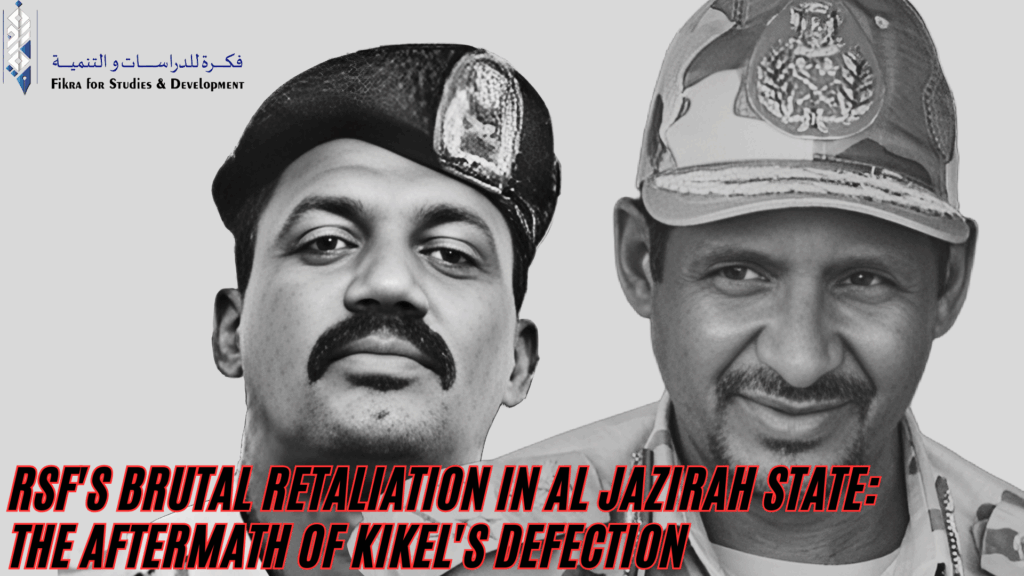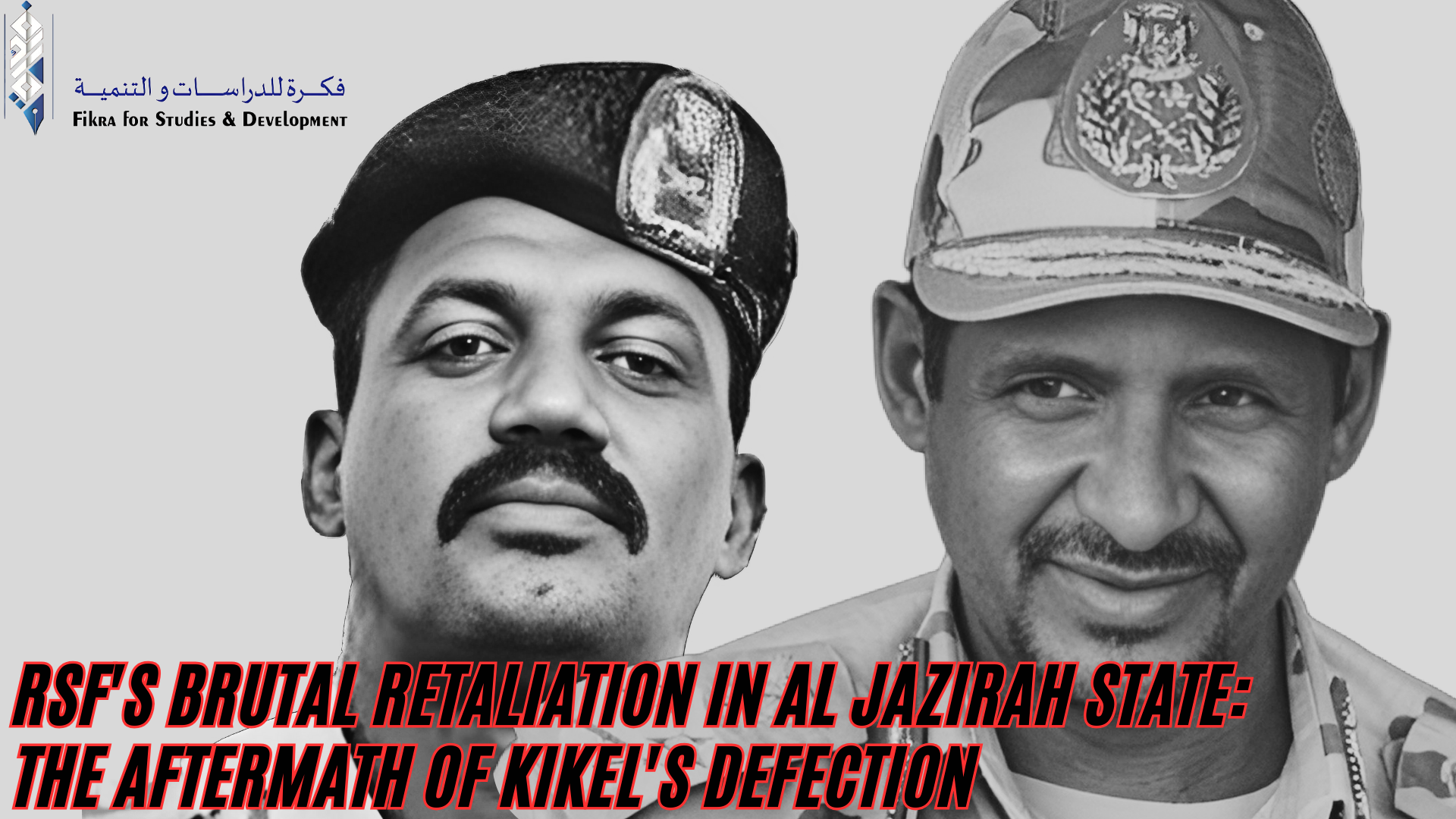RSF’s Brutal Retaliation in Al Jazirah State: The Aftermath of Kikel’s Defection
RSF's Brutal Retaliation in Al Jazirah State: The Aftermath of Kikel's Defection

Amgad Fareid Eltayeb
On October 20, 2024, Abu Aqala Kikel, the field commander of the Rapid Support Forces (RSF) militia in Al Jazirah State, announced his defection from the militia and surrendered to the Sudanese Armed Forces.
Kikel does not differ greatly from Hemediti. He didn’t attend a military academy and had no formal military education or training. Instead, he was part of numerous militias established by the Bashir dictatorship regime during its reign. He then indulged in illicit activities such as arms trafficking before completely committing himself to looting and plunder. Kikel became known as a notorious bandit and criminal in the Butana Plain region, east of Al Jazirah State, where he originally hails from.
Following the coup of October 25, 2021, which ended Sudan’s democratic civilian transition, Kikel announced the formation of a regional militia named the Shield of the North Forces. This militia claimed to consist of 75,000 fighters and demanded the annulment of the Juba Peace Agreement, signed in October 2020 between Sudan’s transitional government and armed movements in Darfur and the Two Areas (South Kordofan and the Nuba Mountains). Elements from the Popular Defense Forces and other ideological militias established during the rule of ousted President Omar al-Bashir clearly dominated the militia’s composition and rhetoric.
Upon its formation, Kikel’s forces declared their allegiance and support for the coup’s partners—the army and the Rapid Support Forces (RSF), who were allies at the time but are now adversaries. When the war broke out in April 2023, Kikel and his forces joined the ranks of the RSF. Kikel led the RSF’s attack on Al Jazirah State on December 21, 2023, and assumed command of the militia forces in the state. In March 2024, Kikel oversaw the establishment of the RSF’s civil administration of Al Jazirah State, in accordance with the Hamdok-Hemedti Agreement signed between the Taqaddum Alliance and the RSF in Addis Ababa in January 2024.
Kikel was directly involved in numerous war crimes in Al Jazirah State during the conflict, such as the Wad al-Noura massacre on June 5, 2024, where militia fighters stormed the village in two consecutive attacks, killing, detaining, and torturing hundreds of residents. Additionally, there were numerous incidents of looting, murder, rape, and torture. After the militia overran and took control of Al Jazirah State, survivors and escapees reported that Kikel directly oversaw the extortion that militia members imposed on citizens and traders attempting to leave the state.
Since Kikel’s defection on October 20, the RSF militia has launched a widespread retaliatory campaign of violence against the areas in East Al Jazirah from which its defected leader hails. Al Jazirah Conference Forum, a local assembly of Al Jazirah residents established after the war in July 2024, reported that the death toll in Tamboul exceeded 300 people in a single day (October 22, 2024) due to the militia’s collective punishment campaign. The RSF militia launched a similar attack on the city of Rufaa on October 21, resulting in 100 deaths, widespread killings, rape of women, and numerous cases of kidnapping and disappearance of girls. Reports emerged of militia soldiers demanding large ransoms for the release of the kidnapped girls. On October 23, the RSF militia stormed the town of Al Hilaliya, committing similar crimes. The village of Al Sireeha experienced the highest number of casualties from the militia’s retaliatory campaign, with the attack lasting an entire day from the early hours of Friday, October 25, 2024. The total number of villages raided by the militia in this ongoing campaign of mass violence has reached 100 in East Al Jazirah alone. Eyewitnesses and video recordings documented incidents of violations against children and boys, with militia soldiers shouting, “Kill a young Kikel before he grows up” and other chants calling for the extermination of the families of defectors and traitors, as they termed them. The militia’s retaliatory campaigns extended to the areas of Al Kamleen, Al Halawin, and other villages in northern and central Al Jazirah, despite their residents having no connection to Kikel.
Siddiq Osman Ahmed, the head of the civil administration appointed by the RSF militia for Al Jazirah State, who is also a member of the National Umma Party, one of the organizations forming the Taqaddum Alliance led by former Prime Minister Abdalla Hamdok, quickly issued a press statement condemning Kikel’s actions as “a betrayal of the cause and the nation,” asserting that it will only bolster their determination, strength, and unity. He maintained that their cause “will not perish with the death of one person, the departure of another, or the betrayal of a traitor.” While Ahmed’s statement remained silent on the violations and massacres committed by the militia across Al Jazirah State, his remarks starkly contrast with his previous statements in which he attempted to deny any connection between his civil administration and the RSF militia, claiming that it was established through elections by the citizens.
The Taqaddum Alliance, despite verbally condemning the RSF’s escalating violence in Al Jazirah State since Kikel’s defection, remains steadfast in its support for the Hamdok-Hemedti Agreement signed in January 2024. This agreement, initially justified as a means to protect civilians in the RSF controlled areas, has evidently failed to mitigate the RSF’s brutal violence culminating to the RSF’s retaliatory campaign following Kikel’s defection. The alliance’s media outlets continue to deflect blame, blaming the victims of taking up arms against the RSF militia and while the official discourse of Taqaddum is drawing false equivalencies with the Sudanese Armed Forces (SAF) for similar deflection. This approach not only undermines the credibility of the alliance whose chairperson resides in UAE (the infamous public supporter of the RSF) and works for one of its thinktanks but also perpetuates the cycle of violence in the region.
Defections within the militia have continued. On Saturday, October 26, 2024, five advisors to the RSF owner, Mohamed Hamdan Dagalo, known as Hemedti, arrived in Portsudan and announced their defection from the militia. In a press conference upon their arrival in Port Sudan, one of them, who was in charge of overseeing eastern Sudan on Hemedti’s advisory council, revealed that the underlying causes of the war were Hemedti’s plans to control the Red Sea coast for the benefit of a foreign country. This country had sent a delegation accompanied by Hemedti’s brother, Al-Quoni, to Sudan prior to the war to prepare for projects on Sudan’s eastern coast, including the controversial “Abu Amama” port, which was opposed by army leaders, leading to the outbreak of the war. He added that the RSF planned to establish 16 camps in the Red Sea state, three airports, and an RSF’s naval force. He further stated, “Hemedti informed us that these projects, in partnership with foreign entities, would be funded with $30 billion in two installments.” He also mentioned the RSF’s intention to deploy 30,000 fighters in eastern Sudan and that he (Hemedti) would seize power if these projects were not approved.
The statements made by the defected advisors seem to be motivated by self-interest and reflect a frantic attempt to evade accountability for the decisions in which they were complicit. Their statement, emerging over 18 months following the outbreak of the war, effectively undermines any semblance of ethical uprightness or political correctness in assessing their current position.
Nonetheless, it underscores the pivotal significance of the contest for dominance over the Sudanese Red Sea Coast in the genesis of the Sudanese conflict. The aspirations of the RSF to extend its influence over Sudan were apparent prior to the onset of fighting. The deployment of its forces to encircle the Meroe Air Base in northern Sudan on April 13, 2023, merely two days prior to the outbreak of the war, served as an unmistakable indication of RSF’s belligerent intentions. Furthermore, the substantial military accumulation by the RSF militia in Khartoum in the weeks preceding the conflict, which encompassed thousands of mercenary combatants, served as a definitive signal of their preplanning for a large-scale offensive aimed at taking control of Khartoum.
The political ambitions and foreign agendas that the owner of the Rapid Support Forces has long sought to serve were the driving force behind the planning and execution of his coup attempt on April 15, 2023. The failure of this coup led to the outbreak of this devastating war that has destroyed the country. However, with the disintegration of the militia and the army’s advancement to reclaim areas previously seized by the RSF, the running for the hills has begun.
This great escape started after Hemedti’s recent speech, in which he escalated his rhetoric and threatened all-out war – as if the situation could get worse. All of this raises fundamental questions about Sudan’s future:
- The RSF Remnant: How can the remnants of the Rapid Support Forces (RSF) militia, who could potentially continue to be supported by external actors to continue fighting in scattered pockets of the country, be dealt with or effectively neutralized to prevent prolonged and localized conflicts?
- The RSF Political Leadership: What is the future of the RSF’s political leadership, especially in light of US sanctions on al-Quoni Dagalo, the younger brother of the militia’s leader, who was seen as a potential successor in leading the militia and its political project?
- Preventing Military Totalitarianism: How can Sudan be safeguarded from descending into a new era of military Totalitarianism?
- The RSF’s divisive policies and tactics have exacerbated tribal and ethnic tensions and polarization in Sudan. To address this, a comprehensive national reconciliation process on the social level is necessary to foster social cohesion. Furthermore, questions of justice, accountability, and transitional justice mechanisms must be carefully considered to address the atrocities committed during the conflict and its preceding period.
Finally, the greatest challenge lies in maintaining Sudan’s civilian democratic transition path post-war, and safeguarding the potentials made by the December revolution. This requires restructuring state institutions to better serve the people, focusing on the most effective ways to achieve this, and redefining political practices to prioritize it over political and ideological conflicts. All necessitate the establishment of robust state institutions that uphold the rule of law and promote social justice.
What we are witnessing today represents a major setback for the aspirations of democracy and peace in Sudan and the entire region. Personal ambitions and foreign agendas have ignited a war that has destroyed many of the gains made by the Sudanese people during their glorious revolution in December 2018. If this bleeding is not stopped, its repercussions will not be limited to Sudan alone but will extend to negatively affect the stability of the entire region. History will not forgive those who destroyed this country and killed, displaced, and tortured its people. With their proud legacy, the Sudanese cannot let this war define them. Instead, these challenges will fortify their strength and determination, sharpening their resolve to persist in the fight for a brighter future.
Amgad Fareid El-Tayeb
Executive Director of Fikra for Studies and Development
Previously served as the Assistant Chief of Staff to the Prime Minister of Sudan; Dr. Abdalla Hamdok during the transitional period following the toppling of the Islamic dictatorship in Sudan. He has also served as a political advisor to the United Nations Special Political Mission in Sudan (UNITAMS) and a visiting fellow at the European Council on Foreign Relations. He made a prominent political and social contribution to the liberation movement to overthrow Bashir’s Islamic regime before and during the December 2018 revolution. He served as the head of the foreign relations committee of the Sudanese Professional Association and Spokesperson of it during the revolution. Founder of the Nafeer Initiative in 2013 and contributed significantly to the establishment of the Girifna and Sudan Change Now movements. He has also written extensively on cases of violations of migrants’ rights, democratization, and issues of military and civil institutional reforms in Sudan. He can be contacted by email at: amjedfarid@gmail.com , Amgad@fikrasd.com
Twitter: @amjedfarid


